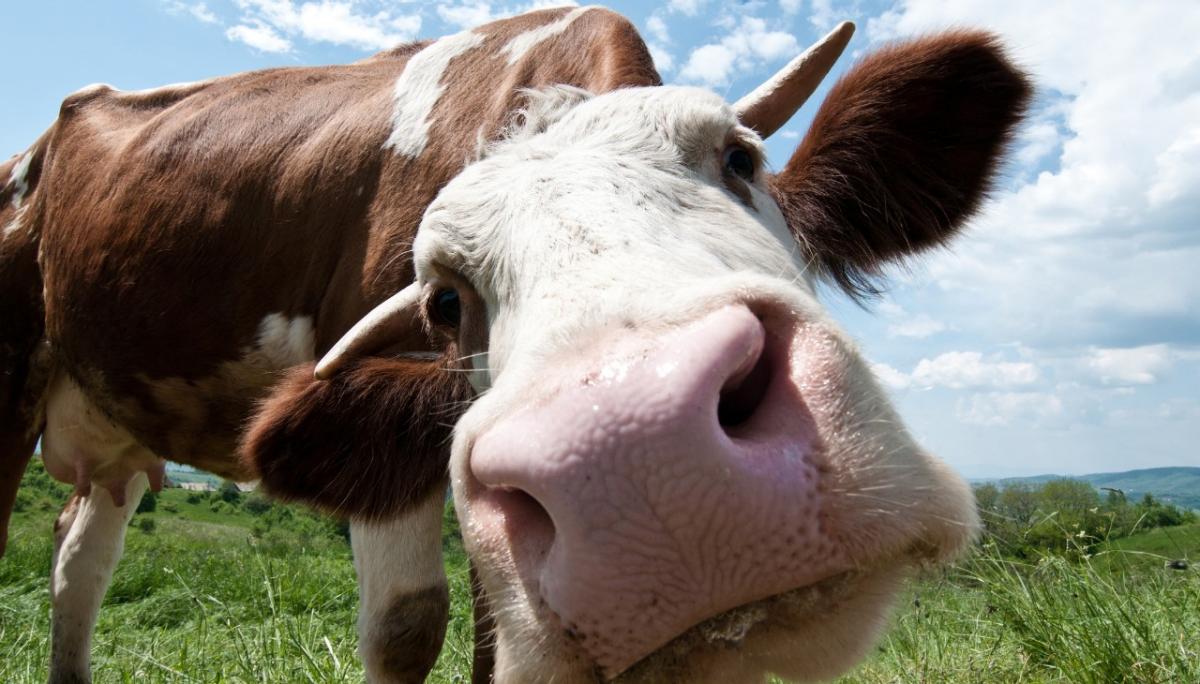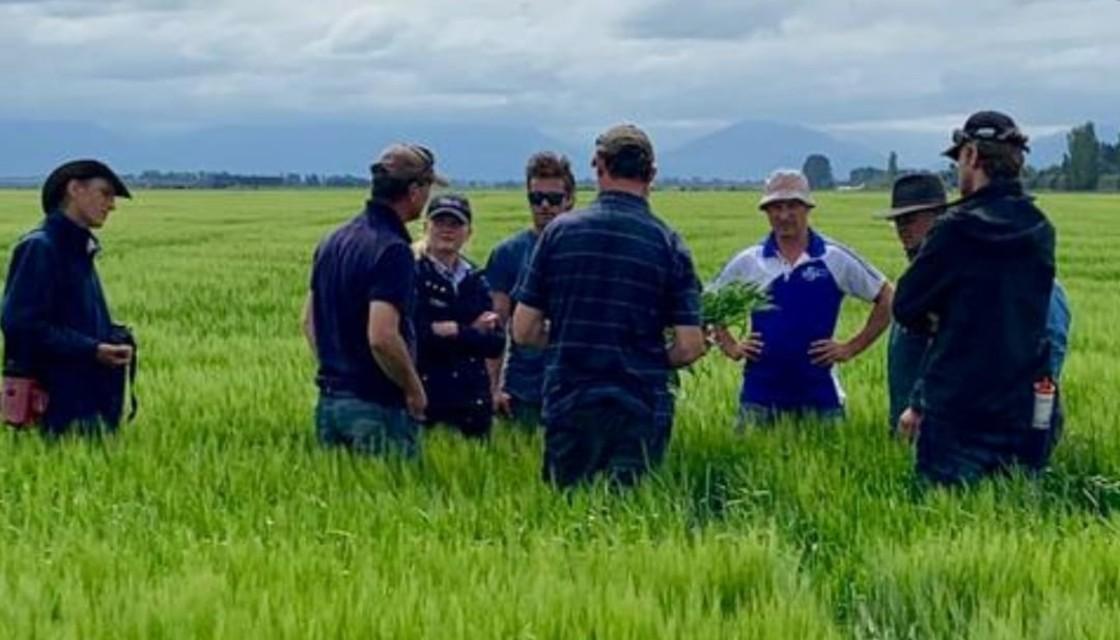
A decade ago, Jono Frew never imagined he would be a champion for regenerative farming.
As a former employee of a chemical and fertiliser company, Frew spent years promoting the use of chemical spraying in the agriculture world, not working to get rid of it.
But now, Frew is one of a growing number of Kiwis who think regenerative agriculture is the future of farming in New Zealand.
At its essence, regenerative agriculture takes a holistic approach to farming, focusing on building diversity and improving the health of top soil - all the while striving to avoid the use of synthetic fertilisers.
Advocates of the movement, which has gained in popularity in recent years, say traditional farming is deeply flawed and no longer sustainable in the face of climate change.
According to the Ministry for the Environment, the agriculture sector accounts for 48 percent of New Zealand's greenhouse gas emissions. Many now say that is too high and are calling for change.
A report by the think tank Koi Tū: The Centre for Informed Future published earlier this year highlighted the need to address issues relating to land use and water-access rights and concluded it was necessary to start adapting to climate change now.
"It is possible that New Zealand’s pastoral ecosystems are now reaching the biophysical limits to growth and even sustainability," the report said, adding that a "coherent and collective strategy" was needed to tackle the challenges the industry faced.
Greenpeace has also lobbied hard for a change to how the country farms, saying the shift to regenerative agriculture needs to happen now in order to "help reverse the damage done to our water, soil, climate and biodiversity" caused by traditional farming.
Frew, who teaches regenerative agriculture through his company Natural Performance Ltd, says the main problem with traditional methods of farming is that they are focused on getting maximum production from the land at all costs.
"If you look at the way we're farming now it really isn't working," Frew told Newshub.
Too many in the industry are "stuck in the old science, the old linear ways of thinking where we have a problem and we fix it with a chemical or a fertilizer", he says.
"When you look at the human health trends and the water pollution, it's clear that we need to do something and this whole movement is what's going to address all of these concerns."
'It's going to help make the world a better place for our children'
Another proponent of the practice is Siobhan Griffin who has a sheep and beef farm near Balclutha, in Otago.
She defines regenerative agriculture as "farming in a way that promotes diversity and builds top soil" and says since shifting to regenerative methods she's seen organic matter in her soil increase year on year.
She says much of her efforts have focused on regenerative grazing, with more paddock management.
"It's not lax grazing where you just kind of let it get tall and half-arse graze it," she says.
"For instance on my dairy farm, I might give them [the stock] two or three breaks a day instead of the one in the day and one at night - so it's a bit more intensive in the grazing."
By changing grazing methods, it's possible for farmers to sequester more soil organic matter and "really suck a lot of CO2 out of the air", she says.
"In fact if New Zealand farmers learned how to manage their pastures like I did, and sequester a half percent of organic matter per year - even if they did half that - they would offset the entire country's greenhouse emissions, including methane. Then people wouldn't have to worry about the cow farts at all."

Griffin believes regenerative agriculture is win-win for everyone.
Not only does it bring farmers more profit per hectare but by increasing diversity on farms it also helps the environment.
Another benefit, she says, is health, "because as you increase the health of the soil you increase the health of the grass and that increases the health of the animals - and in turn it creates healthier food for people."
With agriculture playing such a prominent role in creating greenhouse gasses, Griffin believes farmers have a responsibility to change their ways.
"I think it's really important because it's going to help make the world a better place for our children if we can build up soil and as you do that suck carbon out of the air, because the organic matter goes up and you get something we really need right now."
'It's going crazy'
Although New Zealand might not be at the forefront of the regenerative agriculture movement around the world, Frew says more and more farmers are starting to see the light.
"It's going crazy," he says. "The groundswell is huge."
He believes if more people understood the philosophy behind the movement and the benefits it can bring there would be even more farmers taking to it.
"When you can understand what's going on underneath your feet and all around you and rather than trying to fight nature you go with it you end up winning ten-fold because of it," he says. "Not just financially but socially, environmentally - it just makes total sense."

He summarises the regenerative philosophy as revolving around certain key principles such as diversity, integrated livestock - "a lot of arable farmers don't have livestock and they're vital for ecosystem function" - and "having a living root in the ground at all times". Another key, Frew says, is to "minimise disturbance", which he says comes from the use of chemicals or fertilisers.
Hawke's Bay farmer Dean Martin has seen first-hand the benefits of using less fertiliser.
Since taking over the family's 244-hectare farm from his father more than 10 years ago he says he's "pretty much dropped fertiliser completely".
"When I took over management completely of the farm in 2006, 2007 I started with more of a grazing-type focus - how can we improve our grazing systems to improve the soil life and help soil function and everything else that goes along with it?"
He says changing grazing methods can give maximum benefits with minimal cost and has reduced his yearly outgoings dramatically.
"Our annual spend on fertiliser has been under $500 for the last six or seven years," Martin told Newshub.
That's down from previous costs of around $7000 to $8000, and "even that's a lot less than the standard practice - the standard practice on our size property is probably $12,000-$14,000".
Not everyone's convinced
But not everyone thinks the movement is on the right track.
Dr Doug Edmeades, a soil science expert and managing director of AgKnowledge, says regenerative agriculture is "pseudo-science".
"There is no empirical evidence that supports their claims," he told Newshub.
"They claim that regenerative agriculture results in accumulating more soil organic carbon and hence [can] mitigate climate change. This is nonsense."

Dr Edmeades also says most grassland farmers here are already doing many of the things that define regenerative agriculture, such as rotational grazing, mixed pasture species and zero tillage.
"I think that regenerative agriculture could be a good marketing tool especially given that our New Zealand farmers, what our pastoral farmers are currently doing, can be defined as regenerative agriculture. But let us not delude ourselves thinking we are going to save the planet or create healthier soil or reduce fertiliser inputs," he says.
Another sceptic is soil scientist Dr Jacqueline Rowarth. She says proponents of the movement have it all wrong.
Regenerative agriculture was created in places of dry, overgrazed land such as South Africa's velds and the Dustbowl in the United States, she says, adding that New Zealand's soil has never been degenerated and therefore there is no need to "regenerate" it.
"We don't have the same starting point as the Dustbowl," she told Newshub.
"And if we're going to change the system, because they say it's a holistic approach it has to be adapted to suit different areas, then don't call it regenerative - because our soils are not degenerated.
"Don't take a term that has been designed or has grown up somewhere else in some other country, to describe what New Zealand does far better than they will ever achieve. We've been doing it for 80 years."
Another concern she has is that if New Zealand - one of the most efficient food producers in the world - produces less animal protein then we will end up importing more food from countries that produce it in a way that's less efficient - and therefore less sustainable.
"My concern is what has been proposed - and a lot of it is not backed up scientifically but it looks good - would erode New Zealand's position as one of the most efficient producers of animal protein in the world, environmentally as well as [in terms of] labour.
"New Zealand has a highly productive system, we've got the data on few greenhouse gases and nitrogen loss, so why say this will be better when there is no truth, and actually you've got the proof to say that it wouldn't be."
Dr Rowarth says regenerative farming can be good for individual farmers but on a systematic level it simply would not work for New Zealand.
"I would say what is being proposed will actually break our current system," she says.
"If what you're saying is that a farmer is actually after a lifestyle, that's fine, but don't say the whole of New Zealand should go onto it."
A middle ground
Frew says he is well aware of the criticism and admits it "doesn't paint a pretty picture for the regenerative movement".
But, he says, evidence supporting regenerative claims is growing and the movement is "innovating at a rapid pace".
For Martin, the debate over traditional versus regenerative farming is not productive at all. He says his priority is all about farming in an effective and sustainable way - and the label is irrelevant.
"At the moment there's quite a bit of antagonism between mainstream farming and regenerative farming, which I think is a bit stupid - we're all farmers at the end of the day."
His personal approach draws on knowledge and principles from traditional farming, organic farming, biodynamic farming and more.
"It's taking the best out of all these systems and running with that and making it work for you in your situation."
One scientist who is working towards building more data on regenerative farming is Dr Gwen Grelet.
She remains cautiously optimistic and says from a science perspective it's both challenging and exciting.
"When I look at the ecological principles that underpin regenerative practices, I think there are multiple benefits that can be derived from using these practices - but we need to acquire scientific data specifically for New Zealand," she told Newshub.
"Most of the data on regenerative farming systems come from overseas."
While New Zealand-specific research around some individual practices used in regenerative agriculture does exist, these practices have mostly been studied in isolation and not from a holistic point of view. For other practices, there is not yet any scientific data, only observations from farmers.
"In regenerative farming, practices are seen as tools that can be deployed simultaneously or one after the other, as required specifically for each farm, and there isn’t one size that fits all," says Dr Grelet.
"So we have to design research approaches that allow for the observation of individual farms and productive landscapes as complex adaptive systems, that have variables in practices and are continuously changing."
Because regenerative agriculture takes a holistic approach, practitioners say its benefits should be viewed from an interconnected perspective, which is much more challenging to integrate into a research programme.
Dr Grelet says she understands the need regenerative farmers have for their observations to be tested scientifically. More data would also be helpful for landowners who remain unconvinced and would like to see some hard science about the potential benefits of regenerative farming before investing in it. But, she says, gathering that data takes time.
"It's not that science in itself has let regenerative farmers down, it's just that it's requiring experimental approaches more challenging to implement, where researchers and landowners work together across multiple disciplines and across multiple spatial and temporal scales.
"We've been exploring exciting and promising ways to tackle this," she says
Initial results from a small-scale pilot study on pastoral regenerative farms "suggest some positive impacts" on soil health and biodiversity, Dr Grelet says. However, further study across more farms is still required to establish a "clear link between regenerative management and soil health and biodiversity".
Although much remains to be done until a final verdict can be reached, Dr Grelet says interest across the sector to dig deeper into regenerative agriculture is rising.
"There is growing interest in regenerative farming from investors, Government and industry bodies. So I think there's going to be more research investment to support decision making and identify potential benefits for consumers and society.
"Scientific momentum is building."


